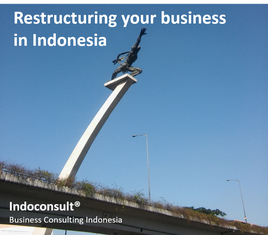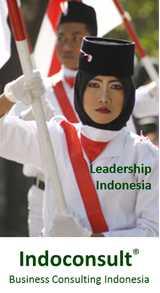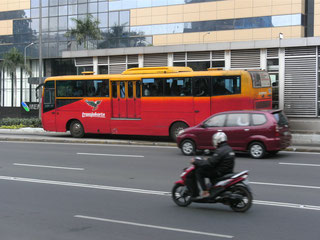Establishing business in Indonesia - what entrepreneurs need to know

Revised article (Nov. 2024)
Author: Christian Hainsch
Indonesia, with its approximately 280 million inhabitants, more than 17,000 tropical islands, is an interesting holiday destination, especially the resort island of Bali. But Indonesia can be more than just a tourist hotspot. The country consistently records sound economic growth and the Indonesian markets are booming in many areas.
Foreign investors are welcome, of course. Indonesia provides lucrative business opportunities for innovative start-ups and companies seeking new markets. The market entry into Indonesia, however, is not that easy. Due to the travel and time distance, but also because of the maze of local rules and regulations, setting up a business in Indonesia can cause a lot of headache. Indonesia is a country full of licenses and permits, which does not make it easy for foreigners to establish and operate business.
Sales in Indonesia

As many markets in Indonesia are growing and some are just emerging, the country offers an interesting potential to sell your products and services.
Many industries and sectors are depending on the import of goods, tools, machinery, equipment and the growing demand of FMCG, F&B and many more will keep Indonesia a country with a strong dependency on imports.
Business mistakes in Indonesia

Over the last couple of years we saw many foreign businesses coming to Indonesia with a huge portion of enthusiasm, good products or services and foreign investors full of engagement and business ideas.
Some of them succeed - but some of them failed.
Many times this failure was dramatic and cost the company money, time, a loss of reputation and sometimes even the whole business. Those companies made some crucial mistakes which can be summarized in a top 10 of "Why do foreign businesses fail in Indonesia".
Negotiating in Indonesia

You have already taken the first hurdles on your way to Indonesia and are preparing for initial negotiations with Indonesian partners or customers? The flight is booked, meetings confirmed and the agenda is set?
That your next steps are going well, you should now be prepared that negotiations in Indonesia run somewhat different than in western countries.
This article shows some peculiarities in negotiations with Indonesian partners and customers and provides a brief overview of Dos and Don'ts.
Restructuring your business in Indonesia

It’s a fact: Many companies operating in Indonesia are having legal structures which are not sustainable on a long-term or which may have negative influence into operations and the business. A typical structure is that a local shareholder involved (either as a nominee or as a partner) in business.
Of course, this might make sense in case of having a “real” local partner, which is many times essential to run business in Indonesia. But in most of the cases the local partner was long, long time ago involved to get better market access, meet regulatory requirements or because it was necessary at that time to get a business license for foreign investment.
It might be time to reconsider your business structure in Indonesia and look out for alternatives.
The business trip to Indonesia - a quick cross-cultural guide part 2

When doing business in foreign countries it is very important to observe the culture. One needs to know the Do's & Don'ts to avoid cultural pit falls and to build a stable basis for good business.
Part 1 (What to wear?) of our blog series showed you how to dress appropriate when on a business trip in Indonesia.
In part 2 we show you some basic business etiquette from correct greeting to a perfect meeting
The business trip to Indonesia - a quick cross-cultural guide part 1

You are on your way for a business trip to Indonesia. The meetings are scheduled, flights and hotels are booked and you have prepared your agenda.
But what about the Do's & Don'ts when meeting with Indonesian business partners? What do you have to take care about? What do you need to pack in luggage to be dressed appropriate? Our new blog series should give you an overview about the basic cross-cultural issues for Indonesia and help you to navigate trough the cultural topics when doing business in and with Indonesia.
In this article you can find some information about how to dress and what to pack in your luggage.
Common mistakes foreign business people make when interacting with Indonesian partners

Indonesian business culture is far different from western style business behavior.
When doing business in Indonesia the difference in cultural and business behavior is one of the biggest challenges for every businessman.
The following article should give you some useful information when interacting with Indonesian Partners and show you some common mistakes westerner’s might make.
Indonesia's culture change in the 21st century

"There are times of change, and in Indonesia we are in the middle of an important culture change."
This change effects all areas of life, business, communication and interaction.
Indonesia Quick Guide - The Pancasila

PANCASILA is Indonesia National Ideology and Constitution. First Draft of PANCASILA was made by President Soekarno on 01 June 1945.
Bhinneka Tunggal Ika is the official national motto of Indonesia. The phrase is Old Javanese translated as Unity in Diversity. It is inscribed in the Indonesian national symbol, Garuda Pancasila.
Leadership in Indonesia

Leading employees and teams never easy to accomplis, but when working in a foreign country some things add-up to make it even more difficult. Leadership depends a lot on culture, on personal behavior, education and social impacts.
In Indonesia, management and leadership styles are strongly influenced by local culture, the cultural diversity of the country, and by the development and history of the country.
This article will show you some important differences in leadership and management between Western countries and Indonesia, and will give you some advice for working with Indonesian employees and teams.
Getting into the Indonesian Market – a quick guide for Investors

The Indonesian economy is booming and promises steady growth. Good opportunities for companies so. But the entry into this huge market is also a challenge for international companies.
Due to a different business understanding, a different way of life and culture, some points should be considered to overcome hurdles and make successful business.
Indonesia on the fast lane

When I started working with Indonesia in 1997 as a project logistics manager for a big German company, the country was far out of my scope – and I was far from knowing a lot about it.
Keeping busy with handling tons of project equipment, arranging import and customs procedures, and makings sure my job was done, I did not realize, or maybe did not care about, what was going on during that time and what impact it would have to Indonesia’s future and thus, to my career and life.
Finding and Selecting the right Business Partner in Indonesia

I have been doing business in Indonesia for almost 15 years. I have met hundreds of people, discussed thousands of business ideas, projects, and development topics.
I can tell you that one of the keys for a successful venture in Indonesia is finding the right business partner. Doing business in Indonesia is never very easy and a lot of things will cause you some headache, but finding the right business partner will alleviate some of your headaches.
Running small business in Indonesia

by Lauri Lahi
Nowadays you can read almost every day how another multinational is bringing its millions of dollars to Indonesia.
But what if you are looking to start a small business in Indonesia?
Let’s look at some of the obstacles and potential solutions.
Doing Business in Indonesia - Why | What | How
Indonesia is a country with good opportunities for doing business. The economy is growing over the last decade with a GDP of 6-7%. Investment climate and chances for foreign investors are improving and the economic outlook is promising.
The following presentation gives an overview about business in Indonesia.
Our Experts are also available giving this presentation at your company or institution. For more information please feel free to contact us.
In the year 2025 - Outlook Indonesia
Published at the KADIN - BSD Bulletin 12/2012
“Washington D.C. – The IMF – Director announced today the new member countries of G10 for the coming year. In addition, the founding countries Indonesia as well as South Korea have been nominated to take part in the G10 round as of January 1, 2026. The nomination of both countries was already expected by analysts as far as both have been part of the so-called SMIT-Group. Indonesia’s President Joko Widodo expressed his gratitude to the IMF and to his fellow citizens, which so he said: “did their best efforts to reach the goals defined in the MP3EI” to become a member of the G10. Indonesia has currently a GDP Growth of 8,5% and has passed China and India in the year 2019 by its growth rates."

